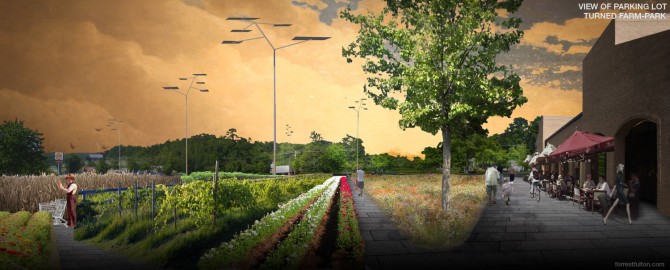 America’s farmland has long been under siege by suburban development. This is nothing new. What is new is that a cease-fire has been called in most parts of the nation. And a conversation is developing about how to move into this new window of opportunity in a manner that not only restores the balance between urban demand and farm supply, but also helps to reenergize our failing economy heavily dependent on the construction industry.
America’s farmland has long been under siege by suburban development. This is nothing new. What is new is that a cease-fire has been called in most parts of the nation. And a conversation is developing about how to move into this new window of opportunity in a manner that not only restores the balance between urban demand and farm supply, but also helps to reenergize our failing economy heavily dependent on the construction industry.
This summer, Reburbia, a suburban design competition, was held by Inhabitat and Dwell Magazine. The competition set out to gather creative and imaginative ideas on how to go about re-visioning the American suburban sprawl that will almost certainly become our suburban wasteland without intervention. Several of the ideas were great, but one in particular caught my eye.
Forrest Fulton designed Big Box Agriculture: A Productive Suburb. In his design he advocates for transforming abandoned big box stores into suburban farms and markets, and I think it is a tremendous idea. Within three miles of my house right now (and I live close to downtown Salt Lake City) there stands an empty big box store that used to be a CompUSA. Yeah. Remember buying that flash drive there last Black Friday as they were going out of business? Well the building is still there. Currently there is a Halloween business pumping plastic jack-o-lanterns and pregnant Brittany Spears costumes into the soon to be saturated October holiday madness. But they will be gone again in another month. The location is perfect. Less than a mile to the East is a long stretch of solid neighborhood. A little further to the West and you will find the same. Right next to the Costco and Sam’s Club there could be a blacktop farm and market.
Fulton’s idea would use the old CompUSA building as a greenhouse and restaurant by replacing most of the roof with glass and the rest with more crops. One could easily imagine a small market to find fresh produce or where one could wash and wrap the harvest one’s self. By keeping the blacktop parking lot and using containers for the farming the urban/suburban farm could maintain flexibility and easy customer access. In a place like salt lake the greenhouse space would prove invaluable as well. Winter roles around and all the plants that need to come inside have a place to stay.
The two problems that I just can’t shake are crime and parking. Ironic that you can’t just plow up all the parking lots in the world to plant crops even though most of these parking lots were farmland not so long ago. I don’t know about the location of most big box stores, but the old CompUSA isn’t in what you would call a walkable neighborhood. And I don’t think Costco is going to like people using their parking lot/derby arena for parking their John Deere. Could an operation like this maintain a shuttle with off-site parking? Is it ridiculous to consider an underground parking garage? Yeah, probably.
The second problem would appear to be crime. I guess you could always put up a ten foot cyclone fence around the whole farm, but that tends to take some of the community feeling out of the friendly local market. I don’t know, maybe there aren’t that many thugs who need to make a tomato-plant-peace-offering to their old lady for shooting out the television. Then again, my church had its freshly planted perennials yanked out just a few months ago.
One last thought to ponder would be the profitability of an operation like this. Urban and suburban property is still pretty pricy in most cities. Can dense, container farming pay the bills? I know I would like to see someone in SLC give it a try in the old building where CompUSA gave up the ghost.